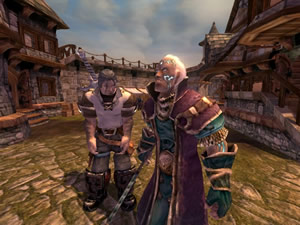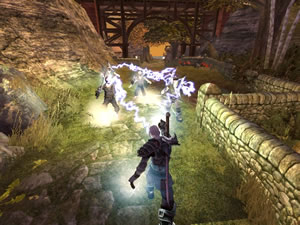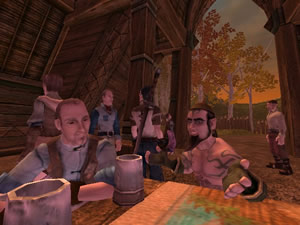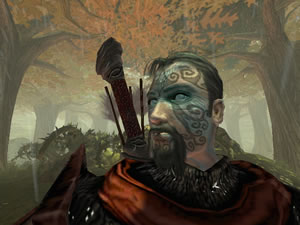A legend in your own mind.
Knowledge might seem like an asset, but knowing too much can be a real bummer.
For instance, if you didn’t previously know a thing about Fable, you’d
turn it on, love it and spend a few sleepless nights obsessively playing it. You would
feel wonderful about the purchase, cradling the receipt in your arms as you drifted
off to sleep.
You would think it was a terrific game.
But the thing is, you probably already know a lot about Fable. You probably already know that it’s the first console game from game design legend Peter Molyneux, the force behind such revolutionary PC works as Populous, Dungeon
Keeper and Black & White. You probably already know all about his talent for coming up with novel gameplay concepts and his unerring desire to break down traditional game design walls. And you probably already know about his grandiose plans for Fable, about the open-ended, realistic game world and the ability to be as good or evil as you see fit.
So
like me, you’re probably going into this review expecting Fable to
be one of the best RPGs of all time. It is not. That being said, it’s still a
successful and compelling game, particularly if you’re blessed with total ignorance.
The less you know, the better it is.
Fable strays from the conventional path right from the start
as you do not create a character. Rather, you begin as a mere child in Oakvale,
a small village in the land of Albion. Your simple life turns upside down when
Oakvale is attacked by ruthless bandits, who put the town to the torch and mercilessly
wipe out the populace. You miraculously escape only to be snatched up by Maze,
the head of the Heroes’ Guild, who takes you under his wing to begin your life anew as a potential hero-for-hire.
The first two hours of the game serve as a long, drawn-out Tutorial, which functions
as a nice way to learn the combat controls and basic interactions. Unfortunately, it is
more tedious than interesting and simply means it takes a bit longer to get into
the meat of the game.
When you get there, though, Fable‘s hype starts to make more
sense. You’re essentially tossed into the world as a fresh faced hero-to-be with
a clean slate, and for the next 15 gameplay hours or so, will go about undertaking
quests to eventually solve the mystery of your family’s
past.
Of course, the real crux of Fable isn’t its story – it’s all
about fame and morality. Nearly every action has a moral consequence, some of
which are obvious (protect the traders or rob the traders) while others are
more subtle (give someone a gift or steal a sword). You gain ‘good’ points for
good deeds and ‘evil’ points for evil deeds, and as you progress, your character
will start to look the part. A seriously good character might have a little halo
over his head and will have many admirers, while a treacherous rogue will grow
horns and inspire fear in the innocents. At times, you feel pretty free to do
what you want to create your kind of protagonist.
Unlike
in other games, your hero is not constrained to a specific class or skill set,
which means you will likely become proficient at all three combat disciplines:
melee, archery and magic. Melee is undoubtedly the most useful and important,
while archery comes in handy much later in the game. Magic is also a necessity
if you want to live past the age of about 30.
 The
The
real-time combat is one of Fable‘s better features. Similar
to Zelda‘s
lock-on feature, the game lets you switch targets at will and toggling between
weapons and magic is a breeze. Though the melee is bereft
of any sort of combo system, the button-mashing is offset by the ability
to quickly cast any of the 16 interesting spells. You’ll swipe at one baddie
with your katana, roll out of harm’s way and toss a fireball at another one,
then quickly pull out your bow to snipe at another enemy 100 yards away. It takes
a bit of getting used to, but eventually the control becomes second nature and
is ultimately quite satisfying.
The XP system is also interesting. Instead of strictly leveling up,
you can increase your ratings in the various skills at any point by visiting
the Heroes’ Guild.
You gain basic XP by completing quests and killing monsters, but you also gain
Strength, Skill, or Will points along as the way depending on how you play.
Focus on melee attacks to gain extra Strength XP, or hurl spells like mad for
extra Will. The extra XP then functions as a buffer when you choose which areas
to upgrade, so if you spend a lot of time casting spells, you’ll have extra
Will XP to spend on better magic. It sounds convoluted, but when you think
about it, it makes perfect sense.
It turns out that you need all three disciplines to succeed in Fable,
so there’s really no point in trying to create a pure fighter or pure wizard.
Renaissance men fare far better in Albion than those who stick to one area of
expertise.
In
this sense, Fable‘s open-ended nature is more of a faí§ade than
a feature. In case you had the notion, Fable is not Morrowind.
Most of the quests are directly related to the story, and the game constantly
reminds you of these by periodically mentioning that “an important quest is waiting
at the guild.” There are a few
side quests to enjoy, but hardly enough to really extend the game.
More side quests and deeper tangents would have given the world a more open feel
and lengthened the surprisingly short experience.
The
bulk of the gameplay involves you going on these quests to unfurl the story or
gain fame. Most quests fall into typical RPG trappings like escorts and dungeon
crawls and are quick, straightforward romps, but to make them more interesting,
Fable allows you to ‘boast’ at the Boasting platform. This mainly
amounts to wagering money on whether or not you can succeed under stricter limitations,
such as doing a quest naked or without taking any damage. There are usually only
four or five pre-determined boasts available for any one quest, and you can’t
mix and match from a giant list to really create your own. Again, if you didn’t
know about it before, you’re better off than those of us who expected the boasting
to be more user-controlled.
And even if you boast like a maniac, you probably won’t have too hard a time
accomplishing your task because Fable is oddly easy. You’ll inevitably
wind up with more than enough cash to spend on a myriad of health replenishing
foods, items and potions. I don’t think I actually died once.
 Part
Part
of that is due to the game’s uninspired enemy A.I; bad guys pretty much just
beeline for you if you’re within
range. The diversity is thin, featuring basic variations on only about a dozen
types of monsters. You’ll fight
a lot of the same things over and over again.
Albion itself, though, is impressively realistic while retaining a distinct,
whimsical feel. NPCs go about their daily business in real-time; when
the sun goes down, shopkeepers close their stores and walk to their homes to
bed down for the night. Townsfolk frequent pubs and can actually drink too
much and pass out. Bandits threaten passers-by as traders wander roads carrying
items from town to town. The game has its own economic model, meaning you can
buy low, sell high, and affect the prices of goods by showing
traders the sharp end of your sword.
There’s simply a lot of stuff crammed into this game. You can buy houses and
collect rent (much like in GTA:
Vice City) or propose marriage and settle down.
You can break into shops at night, steal goods, and sell them back the next day.
You can visit barbers to try on different hairstyles or tattoo artists to add
some ink. Though such peripheral
action primarily functions as a diversion between quests, it helps keep
Albion lively. The game world lives and breathes and is a genuinely cool backdrop
for your adventures.
It
is not, however, a continuous one. Each area is fairly small and the game does
not support seamless loading. If you run from the Heroes’ Guild to Oakvale, expect
to see about ten loading screens along the way.
Hence, most of the time you’ll just be warping from location to location using
the almost too handy Teleport ability. It makes it easier to get around, but,
coupled with the small area maps, keeps Albion from feeling cohesive.
Otherwise,
the technology powering Fable is
impressive. The environments are varied and rich and the world is bursting
with color and detail. Though the facial animations are stiff, the fact that
the game keeps track of the waking/sleeping schedules for just about all of
its inhabitants is in itself a worthy accomplishment. Your avatar is the most
impressive graphical bit, aging as the game goes on, gaining weight if you
overeat, even scarring up if you fight without armor.
A few framerate issues aside, this is a pretty game.
And a treat for the ears, too. The score is appropriately rousing or subtle and
fits the changing moods perfectly. There’s a ton of voice-acting here (though
you, oddly enough, are mostly silent) and it’s all done well. It can get repetitive,
but you’ll want to crank up the volume for most of your time spent in Albion.
 Perhaps
Perhaps
the biggest question about Fable is its replay value.
There’s obviously no multiplayer here, so it all boils down to how much the story
branches based on your alignment. The answer, unfortunately, is very little.
Upon completing the game, you can continue to exist in the world to finish up
any side quests, collect items or just meander about, but it’s just not much
fun. While there are a few different ending sequences based on a combination
of your alignment and one very large decision you make towards the end, you won’t
need to play through the whole thing again to see ’em because the game
actually allows you to change alignment mid-stream by simply going to the good
or evil church and making donations. Whoops! Sort of takes the value out of making
bad decisions when you can pay for instant repentance, eh?
For that matter, playing as an evil character is a little awkward. Even if you’re
a total jerk, robbing people blind and murdering innocents like a serial killer,
you’ll
still have to do nice things during the main quests in order to save your family
and keep the plot moving. Why should I care about my long lost mom when I spend
my days and night terrorizing the land? Fable tries
to squeeze an evil, square hero into a pleasant, round hole, and the result doesn’t
always make much sense.
But by and large, adding this game to your collection does. It helps if you stop
thinking of what Fable isn’t and think more about what it
is – a solid RPG with good action set in an immersive world. The lengthy
tale of this overhyped game might not have a storybook ending, but that doesn’t
mean you shouldn’t
read it.
-
Good action
-
Moral considerations
-
Immersive world
-
Plenty to do
-
Nice delivery
-
Surprisingly linear
-
Too short
-
Boring AI, few enemy types
-
Typical gameplay











